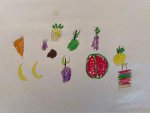Literacy

By iwylie
- 567 reads
When I was young, we had a picture on our refrigerator of a young girl named Katarina held up by a magnet. She was about 13 years old with long dark braids, brown eyes, and totally unsmiling. My older sister was a part of a program where she sent Katarina letters, as well as some money, as a form of cultural exchange. These letters had rules, and were intervened by a third party organization to be translated into Spanish. Principle among these rules was to not speak of your material goods or to gifts received on birthdays, etc, as not to demonstrate the divide. Occasionally, we would get a new photo of Katarina, a little older, with a new color of ribbon in her hair. I remember, as a child, being made uncomfortable by these photos. By the dirt backgrounds. By the well of her eyes. Was her life really so different from mine?
After a recent harvest, Carmen used pages from her kid's old high school notebooks to wrap avocados so they would ripen. Page after page, filled front and back with small, loopy handwriting in blue and red ink crunched around green bulbs. I sat down and helped her. I didn't say anything, but the notebooks seemed to me as something that would usually be saved.
Three people in my community were to be confirmed. Early one morning we all piled into the back of a platanero truck in our Sunday best. The nearest Catholic church in the neighboring town, Fecundo Vela. There was a gentle sunshine, with a cool morning breeze flush on our face, and we all hung on as best we could as we bounced over unpaved roads. A few different communities gathered for the mass, and many people were confirmed.
Various people from the parish took turns reading passages from La Biblia and passed on congratulations. At one point, a person from my community was asked to read a passage. Abelardo, a hardworking man with 9 kids, took off his hat and approached the podium. And the question popped in my head. He sputtered for a minute, and people came to his rescue, and read for him. He repeated for a couple sentences until he stopped, and left the podium, eyes down. The man to the left of me, turned to the pew behind us and answered the question with a snicker: “No puede leer”. He cannot read.
Late one night, it was raining and Juan had not come back from tending to the cattle. Carmen and I ate dinner together- a chicken soup with hot tea. We made small talk about the rain, which is only worth a few sentences. Then, encouraged by our solitude, Carmen told me her story. Although generally not forgetful, she has told me her story a few times now, each time as if it were new. And I think that may be because it has nowhere else to go- and seemingly won't leave her alone. And me, as a college educated, life-long privileged white American, I do nothing but bring it up.
Her story goes like this: She was the eldest daughter of eight siblings, to a controlling, demanding father. Her job as a young girl was to cook, clean, stay in the house, and work in the land, nothing more. He was strict and punitive about how food should be prepared and when it was ready, among other aspects of her life. She met Juan when she was 14 and he was 15, they were soon married and pregnant. Her first time seeing a city, or anywhere beyond her fathers property, was to marry Juan in the neighboring city, Guaranda. She said that out of everyone, she was chosen to stay in the house while her other siblings were educated, including her younger sister. This left her high and dry, inexperienced, and unable to read or write. She still feels it. She laments it.
Of course the papers mean nothing.
Katarina’s and Carmen’s eyes are quite different. Carmen's iris do not form natural circles due to a condition I’ve learned is named pterygium, or in the US, ‘surfers eye’ which occurs under long periods of sun exposure. The sun marks her cheeks, too, like wind burn. Her forearms are thick from a life of milking cows. She proves herself hard working and capable everyday. Yes, her life is and was so very different from mine.
Carmen’s story is not unique. When I completed my needs assessment during my first three months in the community, only one adult I interviewed had completed high school, whereas the majority had not completed elementary school. But this story, from my observation, is not following into the next generation. Children are expected to attend high school. Some don't, but also some go on to university. Still, literacy problems here are massive. Fingerprints are often used instead of signatures and often times only the people who must stay in rural communities do.
The thing about problems with illiteracy is that they are terribly quiet, delicate, and uncomfortable, too. But with each generation comes the opportunity to be like letters from distant lands: rewritten.
- Log in to post comments
Comments
An interesting read, thank
An interesting read, thank you
- Log in to post comments
It's a well written account
It's a well written account iwylie, and nicely done, without being patronising. Literacy problems can be found in even first world countries and like you say they can be quiet - eg the person who stops you in the supermarket and asks you to read the label because they 'forgot their glasses' - but also not so quiet if you look at the percentage of people in prison here (the uk) who can't read or write. The repercussions can be lifechanging
- Log in to post comments


